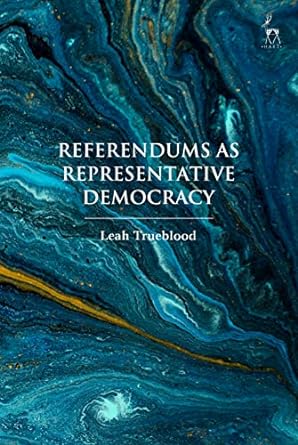Referendums as representative democracy
- ISBN: 9781509940806
- Editorial: Hart Publishing
- Fecha de la edición: 2024
- Lugar de la edición: Oxford. Reino Unido
- Encuadernación: Cartoné
- Medidas: 24 cm
- Nº Pág.: 168
- Idiomas: Inglés

In referendums on fundamental constitutional issues, do the people come together to make decisions instead of representatives? This book argues no. It offers an alternative theory of referendums whereby they are one of many ordinary ways that voters give direction to their representatives. In this way, the book argues that referendums are better understood as exercises in representative democracy. The book challenges the current treatment of referendums in processes of constitutional change both in the UK and around the world. It argues that referendums have been used under the banner of popular sovereignty in a way that undermines representative institutions. This book makes the case for the use of referendums stronger by showing how they can support, rather than undermine, institutions of representative democracy. Understanding referendums as exercises in representative democracy has broader implications for constitutional democracy as well. Rather than see the power to constitute constitutions as something that happens occasionally in exceptional moments through referendums, this book argues instead that voters constantly have the power to constitute and reconstitute their constitutions.
1. Introduction
I.. The Ordinariness of Constitutive Constitutional Referendums
II. Liberal, Higher-Order, and Instrumental Arguments for Referendums
III. Methodology: Taxonomies and Types of Referendums
IV. Referendums in Contemporary Law and Politics
V. Referendums as Representative Democracy
VI. Conclusion
Part I: Against Constitutive Constitutional Referendums as Higher-Order Law-Making
2. Referendums, Votes, and Decisions
I. Introduction
II. Referendums as Higher-Order Law-Making
III. The People Coming Together to Make Decisions Instead of Representatives
IV. The People Coming Together to Make Decisions Instead of Representatives
V. The People Coming Together to Make Decisions Instead of Representatives
VI. The People Coming Together to Make Decisions Instead of Representatives
VII. Referendums as Representative
VIII. Conclusion
3. The Case Against Dualism I
Introduction
II. Defining Dualism
III. Constitutive Constitutional Questions
IV. Challenge One: Content
V. Challenge Two: Consent and Legitimate Authority
VI. Challenge Three: Any Singular Conception of Legitimate Authority
VII. A Piecemeal Case for Referendums
VIII. Against Constitutional Moments
IX. Conclusion
Part II: Constitutive Constitutional Referendums as Representative Democracy
4. Referendums as Representative Democracy
I. Introduction
II. Referendums as Referring Back
III. What are Referendums For?
IV. The Meaning of Mediation
V. Referendums as Representative Democracy
VI. Procedural and Instrumental Arguments for Referendums
VII. A Piecemeal Case for Referendums
VIII. Conclusion
5. Some Uses of Referendums
I. Introduction
II. The Success Conditions of Referendums
III. The Case Against Referendums
IV. Referendums and Political Questions
V. Some Uses of Referendums
VI. Referendums as a 'Remedy'
VII. Conclusion
6. Conclusion
I. The Book's Two Arguments
II. The Future of Referendums
III. Closing Thoughts. . The Future of Referendums






